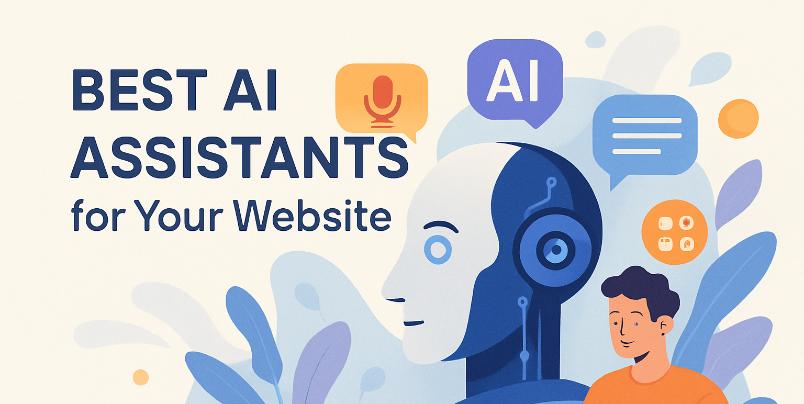Adding an AI assistant to your website isn’t just a tech upgrade—it’s a customer experience revolution. It saves you time, delights your visitors, and keeps your digital presence working 24/7. With the right planning and tools, integrating an AI assistant can be seamless and surprisingly affordable.
In today’s fast-paced digital world, user experience is everything. Whether you’re running an e-commerce store, a service-based business, or a blog, your audience expects quick, seamless interactions. That’s where an AI assistant comes in. Integrating an AI assistant into your website isn’t just about keeping up with trends—it’s about enhancing customer support, improving engagement, and streamlining operations.
Understand the Purpose of Your AI Assistant
Before you dive into tools and tech, get clear on what you want your AI assistant to do. Do you need it to:
-
Answer FAQs and reduce support tickets?
-
Guide users through your product or service offerings?
-
Help with scheduling or lead generation?
-
Offer personalized shopping suggestions?
Knowing the primary goal will shape everything that follows—from the AI platform you choose to the scripts you write.
AI assistants fill this gap by providing 24/7 availability, handling multiple conversations simultaneously, and offering consistent service quality regardless of time zones or peak traffic periods. They can qualify leads, schedule appointments, process orders, troubleshoot technical issues, and even upsell products based on customer behavior patterns.
The business impact is substantial. Companies implementing AI assistants typically see a 40-60% reduction in customer service tickets, 25-35% improvement in customer satisfaction scores, and 20-30% increase in conversion rates. These improvements directly translate to reduced operational costs and increased revenue.
The 30 Best AI Assistants for Website Integration
Zendesk

Zendesk stands as one of the most recognized names in customer support software, and for good reason. This comprehensive platform transforms complex customer interactions into manageable workflows through its robust ticketing system and multichannel approach.
What sets Zendesk apart is its incredible versatility. The platform handles everything from email and phone support to live chat and social media interactions within a single dashboard. The platform integrates with nearly 2,000 other tools, making it incredibly flexible for businesses with existing tech stacks.
The platform’s strength lies in its scalability. Small businesses can start with basic ticketing features, while enterprises can leverage advanced automation, custom fields, and sophisticated routing rules. Zendesk’s reporting capabilities provide deep insights into agent performance, customer satisfaction, and support trends.
Best for: Medium to large businesses that need comprehensive support management with extensive integration options.
Help Scout

Help Scout takes a refreshingly different approach to customer support by focusing on creating personal, email-like conversations rather than impersonal ticket numbers. This philosophy makes customer interactions feel more human and less transactional.
Help Scout offers a feature called Beacon — a widget you can embed on your website or in your app that lets customers browse your help articles without ever leaving the page they’re currently viewing. This self-service approach reduces ticket volume while improving customer satisfaction.
The platform excels in its simplicity without sacrificing functionality. Teams can collaborate seamlessly on customer issues, and the shared inbox approach ensures nothing falls through the cracks. Help Scout’s knowledge base builder is particularly user-friendly, allowing teams to create comprehensive self-service resources.
Best for: Small to medium businesses that prioritize personalized customer interactions and team collaboration.
Intercom

Intercom revolutionizes customer support by blending messaging, automation, and customer engagement into one powerful platform. Rather than treating support as a reactive function, Intercom enables proactive customer communication throughout the entire customer journey.
The platform’s conversational approach makes it feel less like traditional support software and more like a customer relationship platform. Intercom is an AI-driven customer messaging platform that enables businesses connect with their clients in real-time, via personalized messages.
Intercom’s strength lies in its ability to segment customers and deliver targeted messages based on behavior, demographics, or custom attributes. The platform’s bot builder allows businesses to automate common queries while maintaining a conversational tone that customers appreciate.
Best for: SaaS companies and businesses that want to combine support with proactive customer engagement and marketing automation.
Freshdesk

Freshdesk brings enterprise-level functionality to businesses of all sizes through its intuitive interface and comprehensive feature set. The platform strikes an excellent balance between simplicity and power, making it accessible to small teams while scaling effectively for larger organizations.
One of Freshdesk’s standout features is its gamification approach to agent motivation. The platform includes productivity games and leaderboards that make support work more engaging while driving performance improvements. Freshdesk offers nearly 700 integrations through its app marketplace.
The platform’s automation capabilities are particularly impressive, allowing businesses to set up complex workflows that handle routine tasks automatically. This frees up agents to focus on more complex customer issues that require human intervention.
Best for: Growing businesses that need robust features with an easy learning curve and strong automation capabilities.
Zoho Desk

Zoho Desk integrates seamlessly with the broader Zoho ecosystem, making it an excellent choice for businesses already using Zoho’s suite of business applications. However, the platform stands strong on its own merits, offering comprehensive support management features at competitive pricing.
The platform’s context-aware approach ensures agents have complete customer history at their fingertips, including previous interactions, purchase history, and account details. This comprehensive view enables more personalized and effective support interactions.
Zoho Desk’s multichannel capabilities are robust, handling email, phone, chat, social media, and web forms through a unified interface. The platform’s time tracking and billing features make it particularly attractive for businesses that offer billable support services.
Best for: Businesses already in the Zoho ecosystem or those needing comprehensive support management with built-in time tracking capabilities.
LiveChat

LiveChat specializes in real-time customer communication, transforming website visitors into engaged customers through instant support interactions. While primarily known for chat functionality, the platform has evolved into a comprehensive customer communication suite.
The platform’s strength lies in its ability to engage customers at the moment they need help most. Advanced targeting rules allow businesses to trigger chat invitations based on visitor behavior, time on site, or specific pages visited. This proactive approach significantly improves conversion rates and customer satisfaction.
LiveChat’s integration capabilities extend far beyond simple website embedding. The platform connects with popular CRM systems, email marketing tools, and analytics platforms, creating a comprehensive view of customer interactions across all touchpoints.
Best for: E-commerce businesses and websites with high traffic volumes that need to convert visitors into customers through real-time engagement.
Crisp

Crisp combines live chat, email marketing, and customer support into one cohesive platform designed for modern businesses. The platform’s clean interface and powerful features make it an attractive alternative to more complex support solutions.
What makes Crisp unique is its focus on the complete customer communication journey. Beyond traditional support features, the platform includes email campaigns, customer segmentation, and automated messaging sequences that nurture customer relationships over time.
The platform’s shared inbox approach ensures team members can collaborate effectively on customer issues, while the magic browse feature allows agents to see exactly what customers are viewing on your website during chat sessions.
Best for: Small to medium businesses that want to combine support, marketing, and customer engagement in one platform.
Salesforce Service Cloud

Salesforce Service Cloud brings the power of the world’s leading CRM platform to customer support operations. For businesses already using Salesforce for sales and marketing, Service Cloud provides seamless integration and comprehensive customer visibility.
The platform’s case management capabilities are enterprise-grade, handling complex support scenarios with multiple stakeholders, escalation paths, and detailed tracking. Advanced workflow automation ensures consistent support processes while maintaining flexibility for unique situations.
Service Cloud’s AI capabilities, powered by Einstein, provide predictive insights that help agents resolve issues faster and identify potential problems before they impact customers. The platform’s extensive customization options allow businesses to tailor the experience to their specific industry and workflow requirements.
Best for: Enterprise organizations already using Salesforce or those needing highly customizable support solutions with advanced AI capabilities.
Groove

Groove simplifies customer support by focusing on the essentials while maintaining powerful functionality. The platform was built specifically for small businesses that need professional support capabilities without overwhelming complexity.
The shared inbox approach makes team collaboration natural and efficient. Multiple agents can work on complex issues without confusion, and the platform’s collision detection prevents duplicate responses. Groove’s knowledge base integration helps customers find answers independently while reducing ticket volume.
One of Groove’s standout features is its customer satisfaction scoring system, which automatically surveys customers after ticket resolution. This feedback loop provides valuable insights into support quality and areas for improvement.
Best for: Small businesses and startups that need professional support capabilities with minimal complexity and setup time.
HubSpot Service Hub

HubSpot Service Hub integrates customer support with the company’s comprehensive CRM and marketing platform, creating a unified customer experience across all touchpoints. This integration provides unprecedented visibility into the complete customer journey.
The platform’s ticketing system automatically creates customer records and tracks all interactions, providing context that enables more personalized support. The knowledge base builder includes advanced features like content optimization suggestions and performance analytics.
HubSpot’s customer feedback tools go beyond simple satisfaction surveys, providing comprehensive customer health scoring and retention analytics. This data-driven approach helps businesses identify at-risk customers and opportunities for expansion.
Best for: Businesses using HubSpot’s CRM or those wanting integrated support, sales, and marketing capabilities in one platform.
Kayako

Kayako takes a customer journey approach to support, providing complete visibility into every interaction across all channels. The platform’s timeline view shows the entire history of customer relationships, enabling more informed and personalized support decisions.
The unified customer view includes not just support interactions but also sales history, marketing engagement, and product usage data. This comprehensive perspective enables support agents to provide more relevant and effective assistance.
Kayako’s collaboration features are particularly strong, allowing internal teams to work together on complex customer issues while maintaining clear communication and accountability. The platform’s SLA management ensures critical issues receive appropriate priority and attention.
Best for: Mid-market companies that need comprehensive customer journey visibility and strong internal collaboration capabilities.
Freshchat

Freshchat specializes in modern messaging experiences that meet customers where they are, whether that’s on your website, mobile app, or social media platforms. The platform brings consumer messaging app experiences to business customer support.
The platform’s intelligent routing ensures customers connect with the right agent based on skills, availability, and workload. Advanced bot capabilities handle routine inquiries while seamlessly transferring complex issues to human agents with full context preserved.
Freshchat’s proactive messaging capabilities enable businesses to reach out to customers based on behavior triggers, helping prevent issues before they become problems. The platform’s analytics provide detailed insights into messaging performance and customer satisfaction.
Best for: Mobile-first businesses and companies that want modern, messaging-based customer interactions across multiple channels.
Helpshift
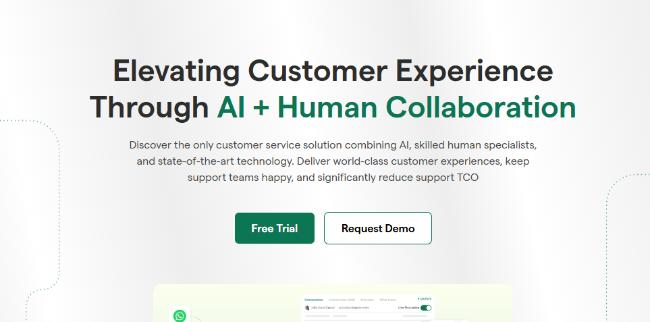
Helpshift focuses specifically on mobile and in-app customer support, providing seamless help experiences within mobile applications. For businesses with significant mobile user bases, Helpshift offers unparalleled integration and user experience.
The platform’s in-app messaging feels native to the mobile experience, encouraging customers to seek help without leaving the application. Advanced features like screen sharing and device diagnostics help agents resolve technical issues more effectively.
Helpshift’s automation capabilities are designed specifically for mobile support scenarios, handling common mobile app issues while escalating complex problems to human agents. The platform’s analytics provide insights into app-specific support trends and user behavior.
Best for: Mobile app developers and businesses with significant mobile customer bases that need seamless in-app support experiences.
Front

Front transforms team email into a collaborative workspace, making shared customer communication efficient and organized. While not traditional support software, Front excels at managing customer communications across email, social media, and other channels.
The platform’s strength lies in its ability to bring transparency and collaboration to traditionally siloed communication channels. Team members can see all customer interactions, add internal comments, and collaborate on responses without customers seeing behind-the-scenes discussions.
Front’s integration capabilities connect with existing business tools, creating workflows that automatically route messages, assign tasks, and track customer interaction history. The platform’s analytics provide insights into response times, team performance, and customer communication patterns.
Best for: Teams that primarily use email for customer communication but need better collaboration and organization capabilities.
AI-Powered Chatbots and AI Assistants
The revolution in artificial intelligence has transformed customer support through intelligent chatbots and AI assistants that provide instant, accurate responses around the clock. These tools handle routine inquiries, qualify leads, and seamlessly escalate complex issues to human agents.
Ada

Ada stands out as a comprehensive AI-powered customer service platform that delivers efficient, high-quality support at scale. The platform’s AI agent continuously improves through machine learning, becoming more accurate and helpful with each interaction.
Ada’s strength lies in its ability to understand context and intent, providing personalized responses that feel natural and helpful. The platform integrates with existing support systems, creating a seamless experience for both customers and support teams. Ada’s analytics provide detailed insights into customer satisfaction and AI performance.
The platform’s no-code interface allows non-technical teams to build and customize AI agents without programming knowledge. Ada’s multilingual capabilities make it ideal for global businesses serving diverse customer bases.
Best for: Enterprise organizations seeking advanced AI capabilities with comprehensive analytics and multilingual support.
Aisera
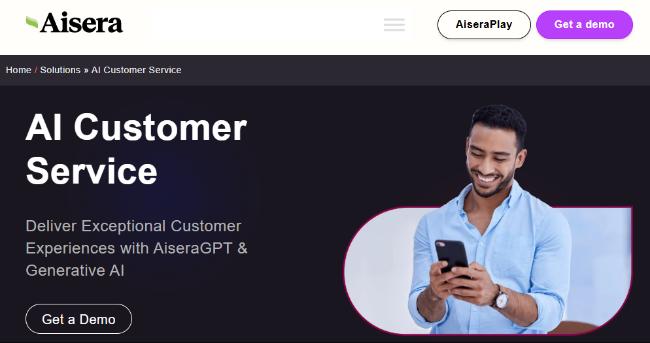
Aisera’s AI Customer Service platform automates 65-80% of customer support tasks through advanced conversational AI. The platform handles everything from simple FAQs to complex troubleshooting scenarios, dramatically reducing support team workload.
What sets Aisera apart is its domain-specific AI models trained for customer service scenarios. The platform understands industry terminology, product specifics, and company policies, providing accurate responses that align with brand voice and values.
Aisera’s integration capabilities extend across multiple business systems, enabling the AI to access real-time information about orders, accounts, and product status. This comprehensive data access ensures customers receive accurate, up-to-date information.
Best for: Large organizations with high support volumes that need significant automation without sacrificing response quality.
ChatBot
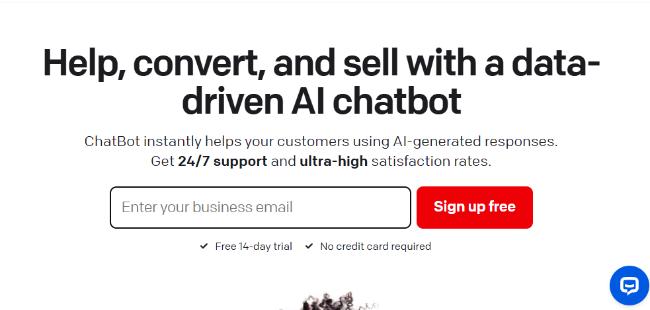
ChatBot offers powerful AI-driven customer support capabilities designed for websites and mobile applications. The platform’s visual builder makes creating sophisticated chatbots accessible to users without technical backgrounds.
The platform’s strength lies in its advanced natural language processing capabilities, which understand customer intent even when questions are phrased differently. ChatBot’s integration marketplace connects with popular business tools, creating comprehensive customer interaction workflows.
ChatBot’s analytics dashboard provides detailed insights into conversation flows, customer satisfaction, and bot performance. The platform’s A/B testing capabilities allow businesses to optimize chatbot interactions for better results.
Best for: E-commerce businesses and websites that need sophisticated AI chat capabilities with easy customization options.
Botpress
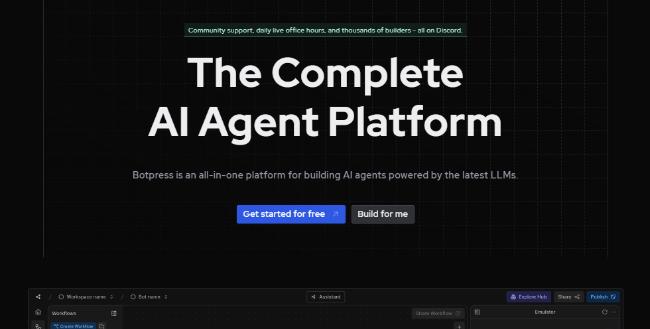
Botpress provides a complete AI agent platform with an intuitive building experience powered by the latest large language models. The platform offers both cloud-hosted and self-hosted deployment options, giving businesses flexibility in how they implement AI support.
The platform’s visual conversation builder allows teams to create complex conversation flows without coding. Botpress supports multiple channels simultaneously, ensuring consistent AI assistance across websites, messaging apps, and voice platforms.
Botpress’s open-source foundation provides transparency and customization options that proprietary platforms can’t match. The platform’s community contributes modules and integrations that extend functionality for specific use cases.
Best for: Developers and technical teams that need flexible, customizable AI chatbot solutions with open-source transparency.
Google Dialogflow
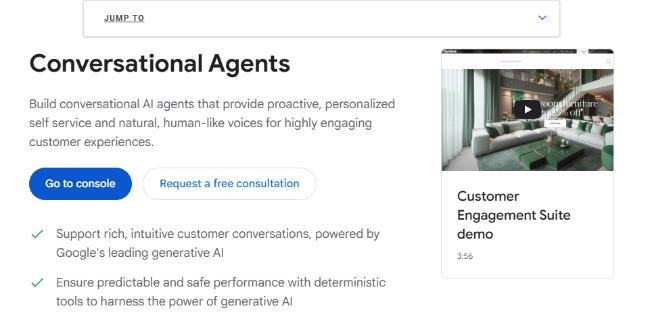
Google Dialogflow serves as a comprehensive platform for developing chatbots, voice bots, and virtual agents using natural language processing and Google’s AI capabilities. The platform handles both text and voice interactions with impressive accuracy.
Dialogflow’s strength lies in its sophisticated natural language understanding, which accurately interprets customer intent across multiple languages. The platform’s integration with Google Cloud services provides access to advanced AI capabilities and enterprise-grade infrastructure.
The platform’s analytics provide detailed insights into conversation patterns, user satisfaction, and areas for improvement. Dialogflow’s scalability makes it suitable for everything from small business chatbots to enterprise-level virtual assistants.
Best for: Businesses already using Google Cloud services or those needing sophisticated natural language processing with voice capabilities.
Voiceflow

Voiceflow helps product teams build, manage, and deploy AI agents to automate customer experiences across multiple channels. The platform’s collaborative approach allows teams to design, prototype, and launch conversational AI solutions together.
The platform’s visual interface makes complex conversation design accessible to non-technical team members. Voiceflow’s collaboration features enable designers, developers, and stakeholders to work together on AI agent development with real-time feedback and iteration.
Voiceflow’s analytics provide comprehensive insights into user interactions, helping teams optimize conversation flows for better customer satisfaction. The platform’s integration capabilities connect with existing business systems for seamless operation.
Best for: Product teams that need collaborative AI agent development with sophisticated design and prototyping capabilities.
Chatfuel

Chatfuel specializes in creating AI chatbots for social media platforms, particularly Facebook Messenger and Instagram. The platform’s focus on social media makes it ideal for businesses that primarily engage customers through social channels.
The platform’s strength lies in its deep integration with Facebook’s ecosystem, enabling rich media interactions, payment processing, and advanced targeting capabilities. Chatfuel’s AI capabilities understand customer intent and provide relevant responses within social media contexts.
Chatfuel’s broadcast features allow businesses to send targeted messages to specific customer segments, combining support functionality with marketing automation. The platform’s analytics provide insights into social media engagement and customer interaction patterns.
Best for: Social media-focused businesses that need AI chatbots integrated with Facebook Messenger and Instagram platforms.
IBM Watson Assistant

IBM Watson Assistant brings enterprise-grade AI capabilities to customer support through advanced natural language processing and machine learning. The platform’s AI understands context, learns from interactions, and provides increasingly accurate responses over time.
Watson Assistant’s strength lies in its ability to handle complex, multi-turn conversations while maintaining context throughout the interaction. The platform’s integration capabilities connect with enterprise systems, providing AI assistants with access to real-time business data.
The platform’s security features meet enterprise compliance requirements, making it suitable for regulated industries with strict data protection needs. Watson Assistant’s analytics provide detailed insights into AI performance and customer satisfaction metrics.
Best for: Enterprise organizations with complex support needs that require enterprise-grade security and compliance capabilities.
Rasa

Rasa offers an open-source conversational AI framework that gives businesses complete control over their AI assistant development and deployment. The platform’s flexibility makes it ideal for organizations with specific customization requirements.
Rasa’s strength lies in its transparency and customization capabilities. Unlike black-box solutions, Rasa allows developers to understand and modify every aspect of the AI assistant’s behavior, ensuring alignment with specific business requirements.
The platform’s machine learning capabilities improve over time through interaction data, while maintaining complete data privacy and control. Rasa’s community provides extensive resources, models, and integrations that accelerate development.
Best for: Technical organizations that need complete control over AI assistant development with open-source flexibility and transparency.
ManyChat

ManyChat focuses on creating AI-powered chatbots for marketing and customer support across messaging platforms. The platform’s visual builder makes sophisticated chatbot creation accessible to marketing teams without technical backgrounds.
The platform’s strength lies in its marketing automation capabilities combined with customer support functionality. ManyChat’s AI can qualify leads, answer product questions, and guide customers through purchase processes while maintaining conversation context.
ManyChat’s analytics provide detailed insights into conversation performance, conversion rates, and customer engagement metrics. The platform’s integration capabilities connect with popular marketing and CRM tools for comprehensive customer journey management.
Best for: Marketing-focused businesses that need AI chatbots to combine lead generation with customer support across messaging platforms.
Acquire

Acquire provides AI-powered customer engagement solutions that combine chatbots, live chat, and video calling in one platform. The AI assistant handles initial customer interactions while seamlessly transferring to human agents when needed.
The platform’s strength lies in its omnichannel approach, providing consistent AI assistance across websites, mobile apps, and social media platforms. Acquire’s AI learns from customer interactions to provide increasingly personalized and accurate responses.
Acquire’s co-browsing and screen sharing capabilities enable AI assistants to provide visual support, making it particularly effective for technical support scenarios. The platform’s analytics provide comprehensive insights into customer interaction patterns and satisfaction metrics.
Best for: Businesses that need comprehensive customer engagement solutions combining AI automation with human support capabilities.
Kommunicate

Kommunicate offers AI-powered customer support automation that integrates chatbots with live chat for hybrid support experiences. The platform’s focus on seamless bot-to-human handoffs ensures customers always receive appropriate assistance.
The platform’s strength lies in its intelligent routing capabilities, which determine when AI can handle inquiries independently and when human intervention is required. Kommunicate’s AI learns from successful human interactions to improve automated responses over time.
Kommunicate’s dashboard provides real-time insights into bot performance, customer satisfaction, and support team efficiency. The platform’s customization options allow businesses to create AI assistants that match their brand voice and style.
Best for: Support teams that want to combine AI automation with human expertise through intelligent routing and seamless handoffs.
Landbot

Landbot creates conversational AI experiences that feel more like interactive conversations than traditional chatbots. The platform’s visual builder enables teams to create engaging, personality-driven AI assistants that align with brand identity.
The platform’s strength lies in its conversation design capabilities, which create engaging user experiences that keep customers involved throughout support interactions. Landbot’s conditional logic enables sophisticated conversation flows that adapt based on customer responses.
Landbot’s integration capabilities connect with popular business tools, enabling AI assistants to access real-time information and perform actions like scheduling appointments or processing orders. The platform’s analytics provide insights into conversation engagement and completion rates.
Best for: Businesses that prioritize engaging, brand-aligned conversational experiences with sophisticated interaction flows.
SwiftCX

SwiftCX provides AI-powered customer support tools including AI Copilot and AI Agent capabilities. The AI Copilot assists human agents during live interactions by offering real-time suggestions, while the AI Agent handles common questions independently.
The platform’s strength lies in its dual approach to AI implementation, supporting both human agents and autonomous customer interactions. SwiftCX’s AI pulls information from tickets, help articles, and knowledge bases to provide accurate, contextual responses.
SwiftCX’s analytics provide detailed insights into AI performance, agent productivity, and customer satisfaction metrics. The platform’s learning capabilities improve response accuracy and relevance over time through interaction data analysis.
Best for: Support teams that want AI assistance for both automated responses and human agent support enhancement.
Choosing the Right Customer Support App for Your Business
Selecting the perfect customer support app depends on several factors unique to your business situation. Consider your current support volume, growth projections, existing tool integrations, budget constraints, and team size when evaluating options.
Small businesses often benefit from simpler platforms like Help Scout or Groove that provide essential functionality without overwhelming complexity. Growing companies might prefer Freshdesk or Zendesk, which offer scalability and advanced features as needs evolve.
Enterprise organizations typically require platforms like Salesforce Service Cloud or comprehensive solutions that provide extensive customization, advanced reporting, and enterprise-grade security features.
For businesses considering AI implementation, start with platforms that offer hybrid approaches combining AI automation with human support. Tools like Kommunicate, SwiftCX, or Acquire provide excellent entry points into AI-powered support without completely replacing human agents.
When evaluating AI-powered solutions, consider the complexity of your typical customer inquiries. Simple FAQ-style questions work well with most AI chatbots, while complex technical support may require more sophisticated platforms like IBM Watson Assistant or Google Dialogflow.
Implementation Best Practices
Successful customer support app implementation goes beyond simply choosing the right platform. Develop a migration plan that includes data transfer, team training, and gradual rollout phases to minimize disruption to ongoing support operations.
Invest time in proper configuration, including automated workflows, escalation rules, and integration setup. These initial investments pay dividends in improved efficiency and consistency as your support operations scale.
Remember that the best customer support app is one that your team will actually use effectively. Prioritize user adoption through comprehensive training and ongoing support to ensure your investment delivers expected returns.
Conclusion
The customer support app landscape offers solutions for every business size and industry, from simple chat widgets to comprehensive enterprise platforms with advanced AI capabilities. The key is matching your specific needs with the right combination of features, scalability, user experience, and automation level.
Traditional platforms like Zendesk, Help Scout, and Freshdesk continue to excel at comprehensive support management, while AI-powered solutions like Ada, Aisera, and ChatBot are revolutionizing how businesses handle routine customer inquiries. The future of customer support lies in hybrid approaches that combine human expertise with AI efficiency.
Take advantage of free trials and demos to test platforms with your actual support scenarios. This hands-on experience will provide valuable insights into how each platform fits your workflow and team dynamics. Pay particular attention to how AI-powered tools handle your specific types of customer inquiries during trial periods.
Remember that great customer support isn’t just about the tools you use—it’s about the commitment to helping customers succeed. The right customer support app simply makes that commitment easier to deliver consistently and efficiently across all customer interactions, whether through human agents, AI assistants, or hybrid approaches that leverage the best of both worlds.

